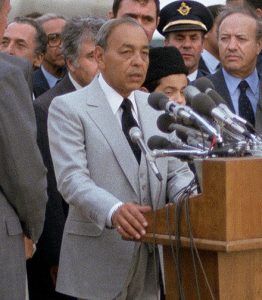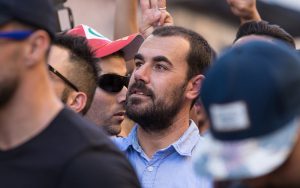Hassan II
King Hassan II of Morocco was King of Morocco from 1961 to 1999, when his son, King Mohammed VI, then succeeded him. Hassan was educated both in Morocco and in France, studying at the Imperial College in Rabat and at L’Université Bordeaux Montaigne before negotiating Morocco’s independence from the French protectorate along with his father, the King Mohammed V. Four years after independence, King Mohammed V died and Hassan II became King on February 26th, 1961.
Western powers were excited about Hassan’s rule as King; He attempted to democratize Moroccan politics with a new constitution preparing for greater parliamentary rule; He maintained a close relationship with the CIA and the West during the Cold War; He maintained peace for Moroccan Jews and maintained positive relations with Israel.
However, Hassan’s rule was in fact authoritarian and rather brutal in his attempts to maintain power. His era of rule became known as the “rule of lead” because of the extent he murdered various civilians. In the Western Sahara, Hassan II ordered thousands of soldiers to fight against Polisario soldiers fighting for independence. During the “Green March,” Hassan’s army seized two thirds of the Western Sahara. Hassan continued to send military into the Western Sahara in attempts to maintain the territory and prevent Algeria from taking over the land.
In reaction to his brutality, Hassan II had to survive various assassination attempts. The military attempted to overthrow Hassan via a military coup in 1971. The coup was to be enacted at Hassan’s birthday party, where over 100 people were killed. Hassan escaped despite rebel’s broadcasting of his death. The coup failed, and as a result, Hassan’s enemies vanished forever. In 1972, in a second attempt to kill the King, jets flew upon the King’s plane, however they failed to bright him down. When extremists killed westerners in Morocco, he dealt with them ruthlessly and often blamed the killings on “Algerian Islamists.” Other dissidents either were jailed, killed, or simply disappeared.
However, Hassan strengthened Morocco internationally through the country’s first constitution, pluralist political system, and a strong tourist and market-based economy. Many Moroccans believed Hassan was given luck and grace, despite his brutality, and respected him.
https://en.wikipedia.org/wiki/Hassan_II_of_Morocco
http://www.economist.com/node/229141
https://www.britannica.com/biography/Hassan-II
http://www.independent.co.uk/news/world/the-two-faces-of-king-hassan-ii-1108656.html
Mohamed VI
Driss Basri
Mehdi Ben Barka

Mehdi Ben Barka was a Moroccan politician who opposed the reign of King Hassan II – he was exiled and killed in response to this opposition. Born in January of 1920 in Rabat, Mehdi was the first Moroccan to earn a degree in mathematics from a French institution. He proceeded to pursue a career in education, but ultimately became a political figure when he joined the Istiqlal Party and, in 1956, formed the National Union of Popular Forces. Among his other positions, Mehdi was the secretary general of the Tricontinental conference; a Cuban organization that supported the development of socialism in third-world countries.
Under Mohammad V, Mehdi was forced into exile for his left-wing republican politics. He returned from exile upon Hassan II’s ascension to the throne in 1962. In the same year an assassination attempt was carried out in which a police vehicle forced his car off of the road. In the 1963 Sand War, fought between Morocco and Algeria, Mehdi supported Algeria and was exiled once again.
Though the circumstances of Mehdi’s assassination remain hazy, certain aspects have been confirmed after decades of investigation. In 1965, he was detained by two French policemen and was never seen again. A former Moroccan secret service operative revealed that Mehdi, after his abduction, was tortured by General Mohammad Oufkir. He died under torture and his body was moved to Rabat, where it was dissolved in acid.
Mehdi is remembered as a revolutionary figure of the third world.
(Text by Naoise Reynolds)
Sources:
https://www.theguardian.com/world/2001/jul/02/victoriabrittain
https://www.britannica.com/biography/Mehdi-Ben-Barka
Abdelkrim El-Khattabi
Saad Eddine El-Othmani
Appointed in 2017, Saad Eddine El-Othmani is the current Prime Minister of Morocco.[1] Born in an Amaigh (Berber) family in the city of Agadir, Saad Eddine El-Othmani began his career as a psychiatrist and holds a degree in Islamic theology.[2] In the late 1990s, be became connected with the Democratic and Constitutional Popular Movement (MPDC) party, a moderate Islamist party with strong ties to the then monarch, King Hassan II.[3] After his first election to Parliament in 1997, he played a key role in the party as it restructured and changed its name to the Party for Justice and Development (PJD) in 1998.[4] A rising member in the party, Othmani served as secretary-general and then as President of the PJD following his replacement in the top position by Abdelilah Benkirane.[5]
In 2011, constitutional reforms in Morocco helped the PJD claim the greatest number of seats in the Parliament.[6] Benkirane, newly installed as Prime Minister, appointed Othmani as Foreign Minister, a post he held until 2013 when the Istiqlal party dropped out of the governing coalition, forcing a reshuffling of government positions.[7] He then returned to his position as the leader of the PJD’s parliamentary group, where he remained through the 2016 elections.[8] However, for five months following the elections, Benkirane failed to form a new government, prompting the king to promote Othmani to the position of Prime Minister in his place.[9] Known for his discrete and conciliatory character and as a man of consensus,[10] the 62-year-old Othmani quickly succeeded in building a governing coalition and continues to serve as Moroccan Prime Minister.[11]
(Text by David Sanders)
[1] “PM Saad Eddine El-Othmani Forms Six-Party Government,” Al Jazeera, March 26, 2017, http://www.aljazeera.com/news/2017/03/pm-saad-eddine-el-othmani-forms-party-government-170326072501082.html.
[2] Roberto Ortiz de Zárate, “Saâdeddin El Othmani,” CIDOB, May 2, 2017, http://www.cidob.org/biografias_lideres_politicos/africa/marruecos/saadeddin_el_othmani.
[3] Ortiz de Zárate.
[4] Ortiz de Zárate.
[5] Francisco Peregil, “El rey de Marruecos nombra a otro islamista nuevo jefe de Gobierno,” El País, March 17, 2017, https://elpais.com/internacional/2017/03/17/actualidad/1489766359_919593.html.
[6] Samia Errazzouki, “Morocco’s King Names PJD’s Othmani as Prime Minister,” Reuters, March 17, 2017, https://www.reuters.com/article/us-morocco-politics/moroccos-king-names-pjds-othmani-as-new-prime-minister-idUSKBN16O1WU.
[7] Ortiz de Zárate, “Saâdeddin El Othmani.”
[8] “Morocco’s King Names Former Foreign Minister as New PM,” Al Jazeera, March 17, 2017, http://www.aljazeera.com/news/2017/03/morocco-king-names-foreign-minister-pm-170317145114580.html.
[9] “Morocco’s King Names Former Foreign Minister as New PM.”
[10] Peregil, “El rey de Marruecos nombra a otro islamista nuevo jefe de Gobierno.”
[11] “PM Saad Eddine El-Othmani Forms Six-Party Government.”
Abdellatif Hammouchi
Polisario Front
Abdelouafi Laftit
Nasser Zefzafi
Nasser Zefzafi is a Moroccan political activist whose activist blood comes from a lineage of political activism. He was born in 1979 in the city of Al Hoceima in northern Morocco, into a family of anti-government, politically active men. Under the rule of Abd-el Krim El Khattabi, Zefzafi’s grandfather served as minister of interior of the Rif Region and his father was an activist of National Union of Popular forces, a leftist party in the country.
Following the tragic death of Mouhcine Fikri, a fishmonger who had a large quantity of his catch confiscated by authorities, in October 2016, the entire Al-Hoceima region took to the street to protest, under the leadership of Nasser Zefzafi. As the founder of the Al-Hirak al-Shaabi movement (the Popular Movement), Zefzafi has become a threat to the government and force to be reckoned with.
On May 29, 2011, Zefzafi was abducted and arrested by the Moroccan police under accounts of threatening national security, undermining interior state security, and obstructing freedom to worship. However, while his stance against corruption, abuse, and injustice is undoubtedly a threat to the government, it is an inspiration to the people. “We are all Zefzafi”, the Moroccan people chant, standing in solidarity and demanding his release.
http://www.euronews.com/2017/05/29/morocco-arrests-rif-protest-leader-nasser-zefzafi
http://www.newsweek.com/morocco-protests-2017-nasser-zefzafi-618731
http://www.bbc.com/news/world-africa-40083535
Ahmed Zafzafi

